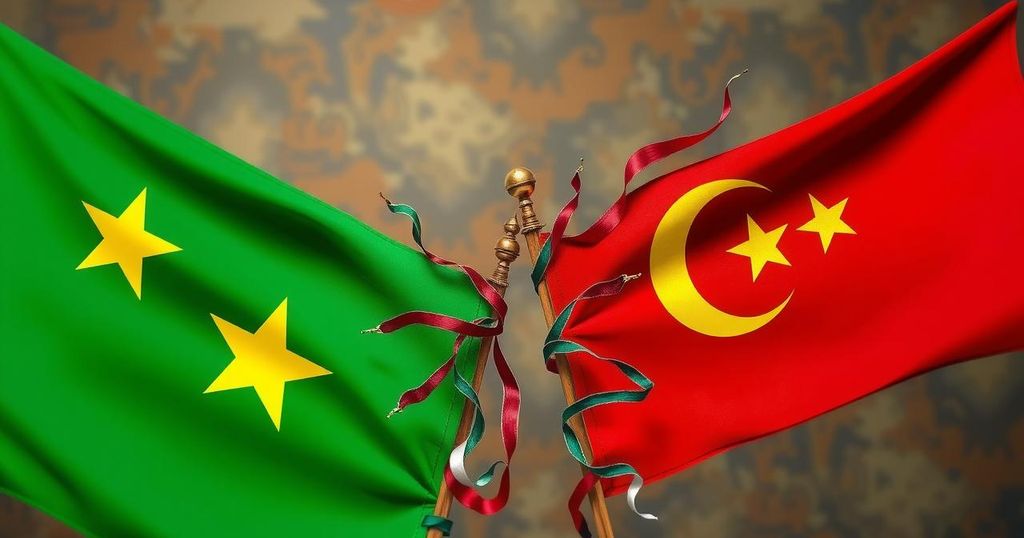Türkiye is mediating tensions between Somalia and Ethiopia prompted by a MoU signed between Somaliland and Ethiopia. With a vested interest in regional stability, Türkiye seeks to resolve the conflict despite challenges posed by entrenched positions and the complex geopolitical landscape of the Horn of Africa. The efficacy of these mediation efforts is critical given the ongoing conflicts in both nations and Ethiopia’s aspirations threatening Somalia’s sovereignty.
Türkiye is actively engaged in mediation efforts between Somalia and Ethiopia, following rising diplomatic tensions fueled by a Memorandum of Understanding (MoU) signed in January 2024 between the breakaway region of Somaliland and Ethiopia. With its long-standing diplomatic ties to both nations, Türkiye is positioned as a credible mediator. The nation has played a significant role in fostering stability in the Horn of Africa through substantial investments in Somalia’s state-building and military capacity against groups such as al-Shabab. Additionally, Türkiye has provided military assistance to Ethiopia in its ongoing conflict against the Tigray People’s Liberation Front (TPLF). In the second round of talks, Foreign Minister Hakan Fidan underscored Türkiye’s objectives by stating, “As Türkiye, our goal is to address the existing concerns and resolve the issues in a way that will benefit not only Somalia and Ethiopia but the entire region.” However, the complexity of the Somali-Ethiopian sea dispute, compounded by entrenched positions regarding national security, presents a formidable challenge. The geopolitical landscape in the Horn of Africa is rapidly evolving, as noted by scholar Tunç Demirtaş, indicating that external interests are also at play. The region has experienced significant violence and political instability. Amid recent conflicts in Somalia and Ethiopia, coupled with the complications arising from the Somaliland-Ethiopia MoU, the Ankara process faces an arduous path toward peace. Abiy Ahmed, who rose to power in Ethiopia in 2018, was initially embraced as a harbinger of change. Nevertheless, his tenure has been marred by violent ethnic conflicts, particularly in Tigray and Amhara, as Ethiopia’s internal dynamics become characterized by military dominance and repression of dissent, as highlighted by scholar Saskia Brechenmacher. Despite Ethiopia’s worsening internal situation, Abiy Ahmed’s nationalistic rhetoric—a call for a revitalized Ethiopia, possibly achieved through territorial expansion—has alarmed neighboring nations like Somalia, Eritrea, and Egypt, leading to heightened tensions. The MoU between the respective governments of Hargeisa and Addis Ababa has been particularly contentious, as Ethiopia’s engagement with Somaliland threatens Somalia’s territorial integrity and sovereignty. Ethiopia’s aspirations for maritime access and military facilities in Bab-el-Mandeb are viewed as imperialistic and provocative by Somalia, which grapples with political fragmentation and military weakness. The Ethiopian government’s overture towards Somaliland indicates a calculated disregard for Somalia’s rights. In a precarious response, President Hassan Sheikh Mohamud’s administration has been criticized for its insufficient reaction to threats against its sovereignty. Amid fears of escalating confrontation, the challenges for the Ankara process remain profound, necessitating a delicate balancing act to de-escalate tensions. According to the United Nations state mediation manual, mediators must operate under the tenets of international law. Ethiopia’s imperialistic ambitions clash with Somalia’s desire to maintain its sovereignty, thus complicating Türkiye’s mediatory efforts. The preference for diplomatic engagement over military access remains crucial to maintaining regional stability. If successful, Türkiye’s involvement could foster a peaceful resolution, yet the stakes are undeniably high, with implications for the entire Horn of Africa region.
The diplomatic tensions between Somalia and Ethiopia have been escalated by the MoU signed between Somaliland and Ethiopia. As regional stability is threatened, Türkiye has taken the initiative to mediate disputes, reflecting its commitment to peace in the Horn of Africa. Given Türkiye’s historical relationship with both nations and its investments in regional security, its involvement is seen as crucial in navigating complex geopolitical interests that involve not only the parties directly in conflict but also regional players like Eritrea and Egypt. The urgency of Türkiye’s diplomatic efforts is underscored by ongoing internal strife within Ethiopia, driven by ethnic competition and nationalistic ambitions.
In summary, Türkiye’s mediation efforts in the Somalia-Ethiopia dispute aim to address longstanding tensions exacerbated by Ethiopia’s engagement with Somaliland. The complexities of regional geopolitics, historical grievances, and overlapping national interests present a significant hurdle for diplomatic resolution. Without constructive dialogue and adherence to international law, the potential for conflict remains high, necessitating concerted efforts from Türkiye and other stakeholders to ensure stability and peace in the Horn of Africa.
Original Source: www.dailysabah.com






